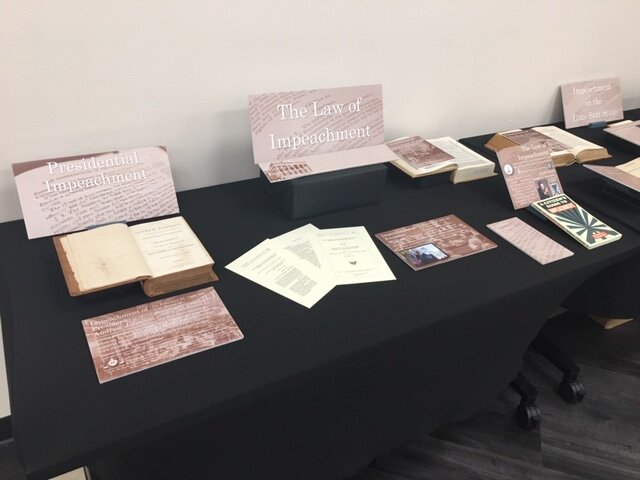This post was written by Jessica King, an extraordinary intern at the Harris County Law Library.
Arabella “Belle” Mansfield. Courtesy of Iowa Department of Human Rights.
In 1869, Arabella Mansfield became the first woman admitted to the Bar in the United States. Her achievement is an important first in the history of women in law, and she is often called the first woman lawyer in the United States.*
Early Life and Education
She was born in Iowa on August 23, 1946, and named Arabella Aurelia Babb, although for much of her life she was also known as “Belle.” When Arabella was six years old, her father died in an accident in the California Gold Rush, and she returned to Iowa with her mother and older brother, Washington Irving Babb.
Arabella later attended college at Iowa Wesleyan University. She graduated in 1866, the same year as her older brother Washington Irving Babb, whose studies had been interrupted by his enlistment during the Civil War. Arabella was the valedictorian and her brother was the salutatorian.
Page showing Arabella and her brother’s senior class listed in the Iowa Wesleyan Academic Catalog of 1865-66. Courtesy of Iowa Wesleyan University
Her brother went into a career in law and became a partner in the new firm Ambler & Babb. Arabella read law as an apprentice in her brother’s office, and kept up her study after marrying John Mansfield, another Iowa Wesleyan graduate.
Passing the Bar
The law excluding Arabella Mansfield from admission to the bar was Iowa Code of 1851, Section 1610. Source: the Iowa Legislature Archives
Arabella Mansfield passed the bar on June 15, 1869. She had to argue her case to be admitted to the bar association, since the law on the books described “any white male citizen” as eligible to be a lawyer. Belle convinced a judge that there was nothing in that law forbidding a woman to be a lawyer. She won the right to be a woman lawyer. She also won the admiration of her bar examiners, quoted below:
Your committee takes unusual pleasure in recommending the admission of Mrs. Mansfield, not only because she is the first lady who has applied for this authority in the state, but because in her examination she has given the very best rebuke possible to the imputation that ladies cannot qualify for the practice of law.
ABA Journal Gallery - 13 Pioneering Women in American Law
The next year, in March, 1870, the law was revised to remove the words “white male.”
Career and Legacy
Arabella Mansfield never practiced law, but enjoyed a successful career in academia, on the faculty of Iowa Wesleyan and DePauw University, as well as lecturing extensively. She was involved in many causes, including women’s suffrage. In her lifetime, she was recognized with honorary membership in the National League of Women Lawyers and honorary membership to the Delta Chi fraternity (for male law students) at DePauw. After her death in 1911, her legacy continues to inspire modern generations. The National Association of Women Lawyers named an award in her honor. She paved the way for many other women lawyers that followed.
Sources and Further Reading:
Louis A. Haselmeyer, Belle A. Mansfield – August 23, 1846 – August 1, 1911, 55 WOMEN LAW. J. 46, 54 (1969). Available via HeinOnline.
A Timeline of Women Lawyers, from the New York Women’s Bar Association
*Note: Margaret Brent, who appeared before the court in the American colonies during the 1600s, has also been called America’s first woman lawyer. Read more about Margaret Brent’s life and achievements on In Custodia Legis from the Law Library of Congress.












